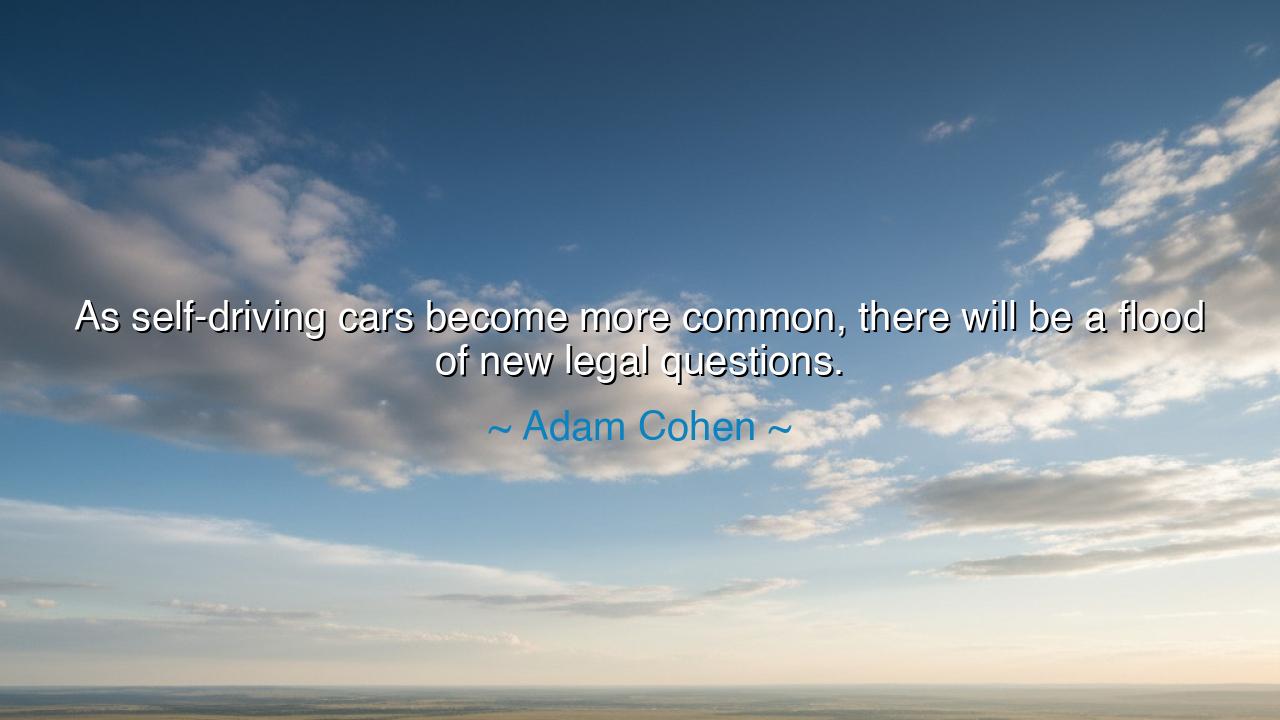
As self-driving cars become more common, there will be a flood of






The words of Adam Cohen, “As self-driving cars become more common, there will be a flood of new legal questions,” sound like a prophecy spoken at the dawn of a new age — an age where man’s creations begin to think, move, and decide on their own. In these words, there is both awe and warning, both the thrill of innovation and the shadow of uncertainty. Cohen’s insight reminds us that every great leap in technology brings not only convenience, but consequence. Just as fire once warmed and burned, and iron once built and destroyed, so too will automation and artificial intelligence reshape the boundaries of human law, morality, and accountability. His statement is a call to prepare — to think not only as inventors but as guardians of justice in a changing world.
The origin of this quote lies in the rise of autonomous vehicles, machines capable of navigating roads, sensing hazards, and making decisions once reserved only for human minds. Adam Cohen, a writer and legal thinker, saw clearly what many could not: that the coming revolution in transportation was not simply mechanical, but ethical and legal. For when a machine drives, who is responsible for its actions? When a car without a driver causes harm, where does liability rest — in the owner, the manufacturer, the programmer, or the code itself? These questions pierce to the heart of law and morality, for they ask not only what is just, but what it means to be human in an age when human choice is no longer required for action.
Throughout history, every great invention has forced society to reconsider its laws and values. When the printing press spread knowledge beyond the control of kings, the world struggled to define truth and authority. When the steam engine reshaped labor, the laws of work and ownership had to be rewritten. So too, with the coming of self-driving cars, humanity faces not only new machines, but new dilemmas — who decides what a machine should do in moments of danger? Should it protect its passengers or pedestrians? Can morality be written into lines of code? Cohen’s words remind us that progress without wisdom leads not to enlightenment, but to confusion, and that law must evolve as swiftly as invention if civilization is to endure.
Consider the story of Mary Ward, who in 1869 became the first recorded person to die in a car accident. Her death, tragic and unforeseen, marked a moment when the marvel of the automobile revealed its hidden danger. Yet out of her tragedy grew a century of safety laws, traffic systems, and regulations that protect billions today. Her story stands as a symbol of how society must learn through trial and responsibility — how each innovation must be guided by conscience as much as by curiosity. Now, as self-driving cars take the stage, humanity faces another such turning point. We are Mary Ward again — standing at the threshold of wonder, unprepared for the new questions it will demand of us.
Beneath Cohen’s warning lies a deeper truth about the nature of law itself. The law is not a wall, fixed and immovable; it is a living river that must flow with the changes of time. When it becomes stagnant, injustice festers. When it flows wisely, it nourishes progress. The coming of self-driving cars is but one example of how technology will test our capacity for adaptation. Tomorrow, there will be intelligent homes, robotic surgeons, and algorithms that write or judge. Each will raise its own “flood of new legal questions,” and the measure of civilization will be how swiftly and fairly it answers them.
But let us not fear the flood; let us build the bridges. Cohen’s insight calls upon lawmakers, thinkers, and citizens alike to engage with these challenges before they overwhelm us. The ancients, too, faced their revolutions — the rise of democracy in Athens, the codification of Roman law — and through courage and wisdom, they forged order from chaos. So too must we meet the age of automation with foresight, shaping new codes that protect both progress and humanity. Technology must serve justice, not replace it, and those who wield innovation must never forget the moral weight of their creations.
Let the lesson of Adam Cohen be remembered by all who live in the age of machines: every invention carries within it a question for the soul. Do not be dazzled by ease, nor blinded by novelty. Ask always — who is accountable, who is protected, who is forgotten? For the future belongs not only to those who build, but to those who govern with wisdom. And when the flood of new questions arrives, as it surely will, may we meet it not with fear, but with the steady hand of conscience — for it is only through law guided by compassion that progress becomes not peril, but purpose.






AAdministratorAdministrator
Welcome, honored guests. Please leave a comment, we will respond soon